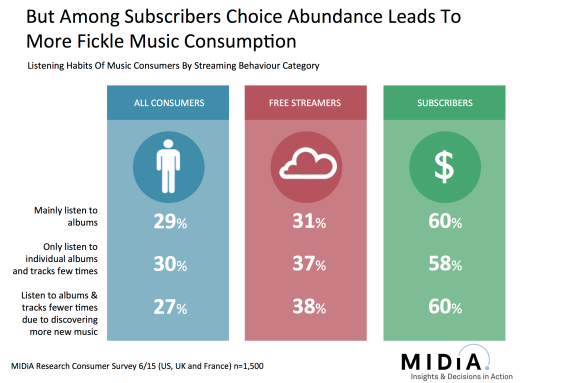On Demand In Demand: Meeting The Needs Of The On Demand Fan [Mark Mulligan]
Today at MIDEM I presented the findings of an exclusive piece of research conducted by MIDiA Research in conjunction with MIDEM entitled ‘On Demand In Demand: Meeting The Needs Of The On Demand Fan’.
Original Post Written By Mark Mulligan on Music Industry Blog
The resulting report will be made available exclusively to MIDEM attendees and also to MIDiA Research subscribers. Here are some highlights.
Streaming is the way in which people engage with music and is creating fundamental behavioural shifts among subscribers emerging that point to the future of music consumption. The abundance of choice represented by 30million tracks is leading to shallower engagement, especially among subscribers. 58% of subscribers report listening to individual albums and tracks just a few times while 60% are doing this more than they used to because the are discovering so much new music. With CDs and downloads the buyers typically listened many times over because a) they had paid for the release and b) it was the only new music they could listen to on-demand. With streaming no such barriers exist. Users can discover, sample, bookmark / like / favourite / add and then move on. Ironically the better that discovery tools function on streaming services the more this trend will exacerbate.
Choice abundance is creating fickle fans
The result is more people are listening to more music, so artists have wider reach, but they are being listened to fewer times by any single person. So total listening volumes are up but the depth of engagement with the majority of those listeners is low. So choice abundance is leading to casual fan relationships. This wide rather than deep approach is great value for music fans and for labels and publishers it translates into revenue diversified across their rosters, often with strong focus on more profitable back catalogue. But for an artist this means more people listening to your music but fewer times. Artist – fan relationships are moving from long term liaison to short term flings.
Fewer super fans now means fewer tickets in 10 years
The implications for the long term careers of artists are profound. On the surface more people listening but less frequently may equate to a net neutral impact on total listens but it means that listeners are not developing the same depth of relationship with individual artists that they did in the era of music sales. The foundations for fandom at scale are weakened. Listening to 30 albums once drives the same streaming revenue as listening to one album 30 times but lays entirely different fan foundations. Acts that can still sell out tours 10 years after their last chart hit can do so because even though much of their audience has aged out of fandom, there were so many of them initially that the decade old remainder is still big enough to be successful with. The 10 year outlook for streaming era artists with a large body of casual fans but small base of dedicated fans is much bleaker. It is no coincidence that we are already in the age of festivals, for these are little more than the playlist writ large as a live event. The future of live will be much more about festivals and multiple act tours which in turn means artists will end up with a smaller slice of revenue.
No hiding place for mediocrity
Another implication of the shift from sales is that sub-standard and mediocre music will not have the safety cushion of dissatisfied purchases. Great marketing and a solid lead single might be able to convince people to buy a poor album but to date there is no technology that can trick them to listen to albums they don’t like. This streaming Darwinism may seem dystopian but there is simply too much music of sub-par quality coming to market. Which makes it difficult for quality to cut through the clutter.
Streaming is rewriting the rules at a rapid pace and though the transformation can at times feel daunting resisting is not a strategy. Change can either be something that happens to you or something that you grab hold of. The music industry is poised on the verge of an entirely new chapter in its evolution nut what is clear is that the clock cannot simply be turned back.
